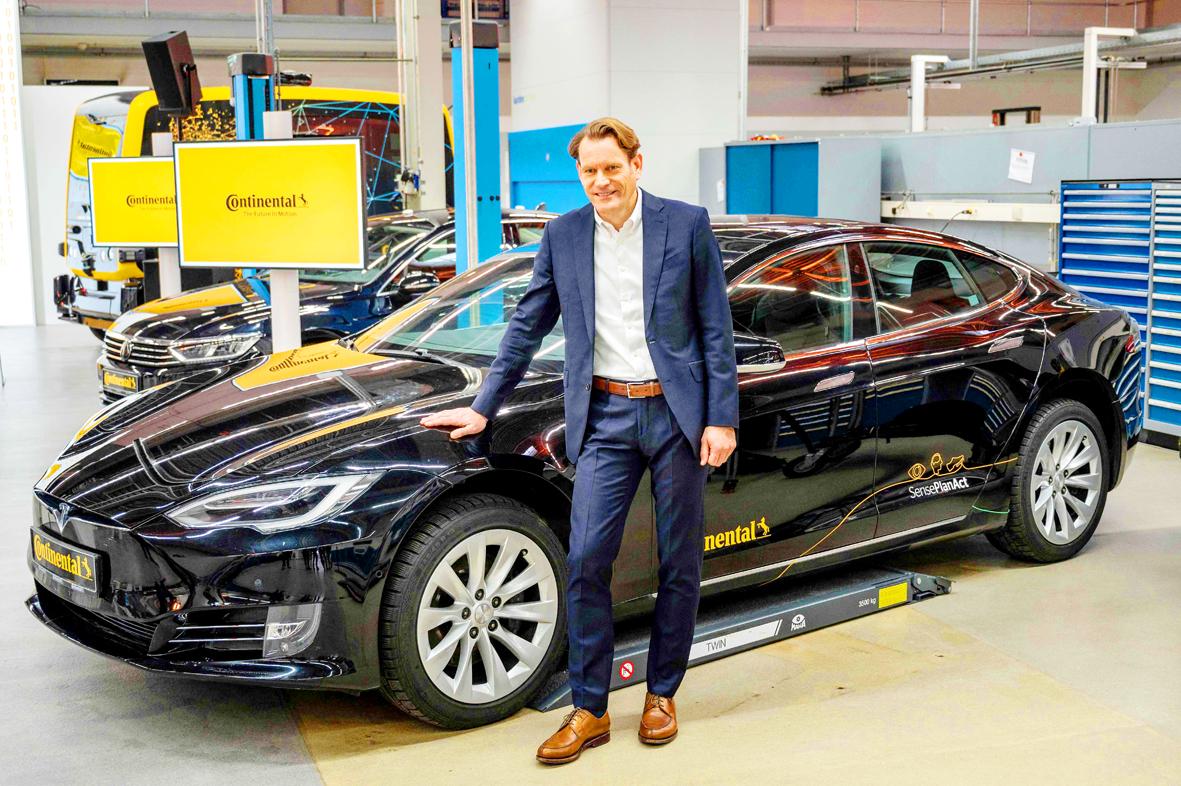China is pressuring German vehicle parts giant Continental AG to stop using components made in Lithuania, two people familiar with the matter told Reuters, amid a dispute between Beijing and the Baltic state over Taipei setting up a representative office bearing the name “Taiwan” in Vilnius.
The targeting of Continental is an example of how the China-Lithuania diplomatic spat is spilling over into business in an era of global supply chains and affecting Germany’s vehicle industry, a lucrative pillar of Europe’s biggest economy.
The Chinese government last month downgraded diplomatic ties with Lithuania after the opening of the Taiwanese Representative Office in Lithuania.

Photo: AFP
Lithuania’s ruling coalition last year also agreed to support what it described as “those fighting for freedom” in Taiwan.
Continental, one of the world’s largest vehicle parts makers, has production facilities in Lithuania, making electronic parts such as controllers for vehicle doors and seats, and exports to clients globally including China.
German industry sources said that the pressure was not only being felt by Continental, but up to a dozen companies, mainly from the automotive and agricultural sectors, they said.
Continental, which supplies all of Germany’s big automakers, declined to comment on whether it had been asked by Beijing to cut links with Lithuania.
The Chinese Ministry of Foreign Affairs denied that Beijing had pressured multinational companies not to use Lithuanian-produced parts, but said that Chinese companies no longer trusted Lithuania.
“The practice of ‘one China, one Taiwan’ grossly interferes in China’s internal affairs and seriously violates China’s core interests,” a ministry spokesperson added.
“I heard that many Chinese companies no longer regard Lithuania as a trustworthy partner,” the spokesperson said. “Lithuania has to look at itself for the reason why Lithuanian companies are facing difficulties in trade and economic cooperation in China.”
Beijing has pressured countries to downgrade or sever their relations with Taiwan.
Earlier this month, a senior official and an industry body said that China had told multinationals to sever ties with Lithuania or face being shut out of the Chinese market.
Lithuania’s direct trade with China is modest, but its export-based economy is home to hundreds of firms that make products such as furniture, lasers, food and clothing for multinationals that sell to China.
The Lithuanian Ministry of Foreign Affairs said: “Companies operating in Lithuania have successfully integrated themselves into international supply chains, so China’s economic pressure measures may cause various disruptions to companies operating in Lithuania.”
“We closely monitor, analyze and evaluate each such case, including among these German companies,” the ministry said, adding that it was “looking for long-term sustainable solutions and ways to resume trade flows with China.”

Application-specific integrated circuit designer Faraday Technology Corp (智原) yesterday said that although revenue this quarter would decline 30 percent from last quarter, it retained its full-year forecast of revenue growth of 100 percent. The company attributed the quarterly drop to a slowdown in customers’ production of chips using Faraday’s advanced packaging technology. The company is still confident about its revenue growth this year, given its strong “design-win” — or the projects it won to help customers design their chips, Faraday president Steve Wang (王國雍) told an online earnings conference. “The design-win this year is better than we expected. We believe we will win

Intel Corp chief executive officer Lip-Bu Tan (陳立武) is expected to meet with Taiwanese suppliers next month in conjunction with the opening of the Computex Taipei trade show, supply chain sources said on Monday. The visit, the first for Tan to Taiwan since assuming his new post last month, would be aimed at enhancing Intel’s ties with suppliers in Taiwan as he attempts to help turn around the struggling US chipmaker, the sources said. Tan is to hold a banquet to celebrate Intel’s 40-year presence in Taiwan before Computex opens on May 20 and invite dozens of Taiwanese suppliers to exchange views

Chizuko Kimura has become the first female sushi chef in the world to win a Michelin star, fulfilling a promise she made to her dying husband to continue his legacy. The 54-year-old Japanese chef regained the Michelin star her late husband, Shunei Kimura, won three years ago for their Sushi Shunei restaurant in Paris. For Shunei Kimura, the star was a dream come true. However, the joy was short-lived. He died from cancer just three months later in June 2022. He was 65. The following year, the restaurant in the heart of Montmartre lost its star rating. Chizuko Kimura insisted that the new star is still down

While China’s leaders use their economic and political might to fight US President Donald Trump’s trade war “to the end,” its army of social media soldiers are embarking on a more humorous campaign online. Trump’s tariff blitz has seen Washington and Beijing impose eye-watering duties on imports from the other, fanning a standoff between the economic superpowers that has sparked global recession fears and sent markets into a tailspin. Trump says his policy is a response to years of being “ripped off” by other countries and aims to bring manufacturing to the US, forcing companies to employ US workers. However, China’s online warriors